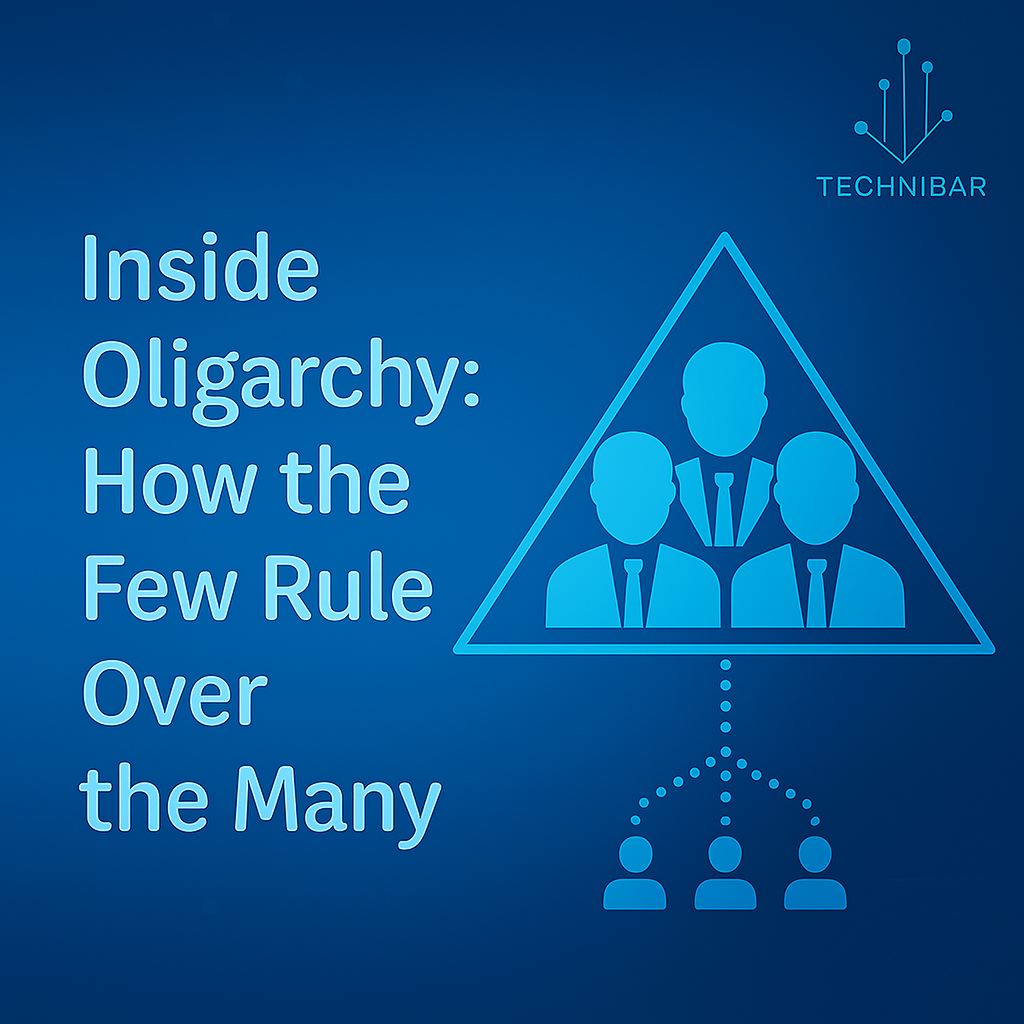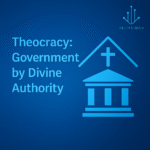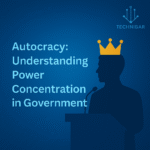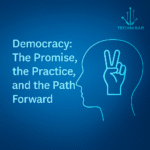Oligarchy is a political and social way of life in which there is a small concentrated group that holds power of society as opposed to its distribution to the masses. In oligarchy, as opposed to democracies, power is reserved to a small section of the society, usually on grounds of wealth, clan affiliation, possession of military might or corporate interest. It may be considered as a bad thing, however, oligarchies are not always apparent and noticeable. Even broader democratic systems have elements of oligarchy in many of the modern systems. This article will investigate the meaning of oligarchy, its working operation, its history and how it is applied in the world today.
What Is an Oligarchy?
The word oligarchy is composed of Greek words oligos (few) and archia (rule). Its actual meaning is the rule by the few. Oligarchy denotes the rule of a small group that bears an excessive power over political, economic, or social issues. These are a group of the elite who though not necessarily the official rulers wield a lot of influence in the background.
Aristocratic Oligarchy is the authority wielded by nobility families or noble elites.
Plutocratic Oligarchy: A state of control by the rich.
Military Oligarchy: Rule by a government of the military officers or in this case juntas. Corporate Oligarchy: Wealthy businessmen or companies run things politically.
Although not to be constitutionally defined, as democracy or monarchy are, still, the definition of oligarchy traces the power balance of all the existing political regimes of the past and up to date.
Oligarchy around the World-Historical Background
Millennia have existed oligarchic rule. Small groups of the elite have ruled some of the earliest and most powerful civilizations.
Ancient Greece
Ironically, the same country where democracy was born is also one of the first examples of oligarchy. Decision making in Sparta was limited to a small group of aristocrats. Even in Athens, the early form of democracy was also restricted to only the free, land-owning men, practically excluding the three groups of people, women, slaves, and non-citizens, which created the oligarchic form of democracy.
Roman Republic
Although the Roman Republic included such democratic institutions as the Senate, the elected consuls, they were controlled by patrician people, who were wealthy landowners and aristocratic families. The real power was deposited in the hands of the few Elite Romans.
Feudal Europe
In the Middle Age, monarchs, nobles, and the clergy in Europe controlled power. In many cases the right to govern and to have the supreme military forces belonged to feudal lords and all that despite the fact that people still had their kings.
Merchant Republics
Commercial oligarchies arose in Venice and Florence as families such as the Medici families exerted their influence over economic life and were able to control banking, politics and culture during the renaissance period.
Suggest to Read this: What is autocracy?
Traits of Oligarchy
Forms of oligarchy are many, although they commonly share the following characteristics:
The Power Concentration
This circumstance entails that a small group, characterized by wealth, family and or status makes major political, legal and economic decisions sometimes without accountability to a wider society.
Political Half-Heartedness
Political participation may even be closed off in oligarchies, formally (by courts, e.g. through voting restrictions) or informally (e.g. by campaign financing limits).
Economic Disparity
The major distinction between the ruling elite and the rest of the people is common in oligarchies where oligarchs command huge resources.
Sway over Institutions
Oligarchs have control since they influence judicial systems, media, and even house of legislature.
Untransparency
Majority of the decisions are taken secretly and people do not even know which are the people behind power.
Examples of Oligarchy in Modern days
There are actually numerous states that consider themselves to be democratic even though they are highly oligarchic in the real world.
Russia
Contemporary Russia is continuously described as being a plutocratic oligarchy, with power concentrated in the hands of the few, who are ultra-wealthy businessmen (popularly known as oligarchs) and who have immediate access to the Kremlin. Such elites are able to dictate political policies, can dominate major sectors of the economy and enjoy legal protection.
United States (Argued)
Other theorists also believe that the United States is an oligarchic country (despite being a constitutional representative democracy) because of wealthy donors, corporate lobbying and political action committees (PACs). A Princeton study carried out in 2014 indicated that the controlling effect of policy related to public opinion is minimal when compared to the interests of the elites and corporations.
China
China has some oligarchic features in its political system despite the ruling of the Chinese Communist Party. Major state-owned enterprises and policy-making are under the control of high party officials and family elites often known as the red aristocracy as well as political criticisms are strictly limited.
Saudi Arabia
Saudi Arabia is a state that has both monarchy and oligarchy, and the royal family and the most influential tribal elites obtain the main power. Only a small group of royals makes both economic and political decisions and the role of the population is insignificant.
The Persisting Power of Oligarchies The retention of power by Oligarchies is a matter to which we now call attention, and a question which concerns us in our purity and freedom of this country.
Oligarchies are propped up by two different strategies combined:
Economic Control
The elites influence legislations and policies by contributing to campaigns or lobbying or outright participation in governing processes, especially by having one of them elected to a position.
Manipulation under the Law
The dictates of an oligarchy can be laws to preserve the wealth of the elites (e.g., tax loopholes), to curtail competition, or to curb demonstration and dissent.
Monitoring of Information
Media control enables the oligarchs to exercise power in setting up the public discourse, silencing and encouraging the media to highlight positive stories.
Patronage and Corruption
Political oligarchies tend to buy their loyalty, e.g. by proving employment, contracts or defense against opponents.
Effect of Oligarchy on Society
Oligarchies may have devastating results to a stable politics, economical growth and social justice.
Undermining Democracy
In a country where a relatively small elite is making decisions, government institutions are mere figurative. Elections can also lose their credibility with voters and lead them out of civil life.
Widening Inequality
Oligarchies tend to cause an extreme difference in incomes and wealths with those with money profiting further whereas the rest of the population suffers with the degradation of their services as well.
Corruption
In the absence of responsibility, corruption turns out to be systematic. Misappropriation of governmental money, bribery and nepotism are standard examples.
Social Unrest
The feeling of injustice as well as control increases with the spread of inequality and suppression. This may lead to demonstrations, stability or even revolutions.
The Reformability of Oligarchies
To an extent; however, change is not easy, particularly when the elites are interested in keeping things as they are. The reform process could contain:
Fortification of Democratic Institutions
Elite power can be balanced by independent courts and a free press, as well as the strong civil society.
Campaign Finance Reform
One way of curbing the overbearing power of the rich is by restricting the amount of money in politics.
Progressive Taxation
The redistribution of resources and decrease of economic inequality can be implemented through enforcing taxes on wealth and inheritance in a much more effective manner.
Public Engagement
Power can be devolved from the ruling classes by educating people, involving them as voters, and deepening accountability and openness.
Oligarchy in the Pop Culture and Literature
Oligarchies have been discussed over time in dystopian literature and media:
- In 1984 by George Orwell, a totalitarian society is shown with all operations being manipulated by an elite group in all walks of life.
- According to Suzanne Collins in her book The Hunger Games, a society under the influence of a prosperous Capitol is being deprived.
- The powerful corporations in science fiction and cyberpunk genres commonly usurp the role of government becoming corporate oligarchies.
Such writings also become indications of widespread fear of centralized authority and injustice among people.
Oligarchy and The Future
The kind of oligarchy is changing in an environment of globalization and digitization. Whereas monarchies and military dictatorships are in the decline, oligarchies of corporations and technologies are on the increase.
Big Tech and Control of Information
There are corporations such as Google, Meta (Facebook), and Amazon, who have a wildly powerful impact on information, trade, and even on elections. Critics are even warning that this is an invisible new version of oligarchic control.
Wealth Concentration Wealth Concentration Concentration on wealth in the world Concentration in the world of wealth
Since billionaires are accumulating wealth to the extent of the whole state, their influence of being able to iron out policies at a global level, such as climate, labor, and commerce, brings to light concerns regarding their issues of morality and politics.
Data and Surveillance Power
Information is the new oil and the owners of information can manipulate behavior, control governments and forecast society. These have brought controversies on the issues of privacy, power and democracy.
Conclusion
Oligarchy, that is, the rule of a few, is a constant and flexible form of government that has had many incarnations over time. In ancient aristocracies and modern plutocracies, oligarchies can and often do give power to a privileged few at the cost of more extensive interaction and equality in society. The problem of oligarchic influence is usually camouflaged through the guises of democracy or that of corporate means, however, it is one of the primary threats to actual democracy in the modern world. These dynamics have to be identified, comprehended and dealt with in order to create a more egalitarian, inclusive and answerable society.
FAQS
1. What is oligarchy?
The oligarchy is a kind of government or power regime where power is concentrated in the hands of a few individuals and it may be due to wealth, family, army presence, or corporate authority. These elites usually make the most important decisions without the major input of the majority of the people.
2. What is the way in which the oligarchy is different from a democracy?
In a democracy, authority is shared between the populace or by their elected officials and decisions will be reached by free involvement. Conversely, an oligarchy gives power to a small group of people and it typically neglects the opinions of the masses and restricts political rivalry.
3. Which are some of the examples of oligarchies nowadays?
Examples include:
In Russia, where politics and policy are influenced by strong business elites (oligarchs).
- China where the government and the economy are run by the best of the Communist Party.
- Saudi Arabia is an example of the geographical location where power is consolidated among the royal household and elites.
Other democracies such as the United States are also castigated as having oligarchic leanings because of excessive power of rich people and corporations.
4. What are the risks or the demerits of an oligarchy?
Many times the oligarchies result in:
- High levels of inequality between the rich and the poor
- Abuse and irresponsibility
- Crush of oppositional politics and opinions
- The wearing away of democracy institutions
- Low social mobility and good equality
Since decisions are made to be beneficial to the few then the needs of the majority are likely to be forgotten.
5. Is it possible to see a country retreating oligarchy to a more democratic rule?
Yes, though a tremendous reform is necessary on the following points::
- Enhancement of democratic institutions
- Advocating openness and freedom of the press
- Fair Taxation and Campaign Finance Laws: This item implies the enactment of fair taxation laws and also fair laws on campaign financing.
- Promotion of civic education/political engagement
The exits towards oligarchy are not always easy, at least when elites do not want to lose their positions of power, but change can be caused by popular pressure and institutional reform.









